Demolition Contractors Salem
Find Demolition Services in Salem
Get up to 3 Demo Contractor quotes for your project today! Compare profiles, reviews, accreditations, portfolio, etc... and choose the best service.
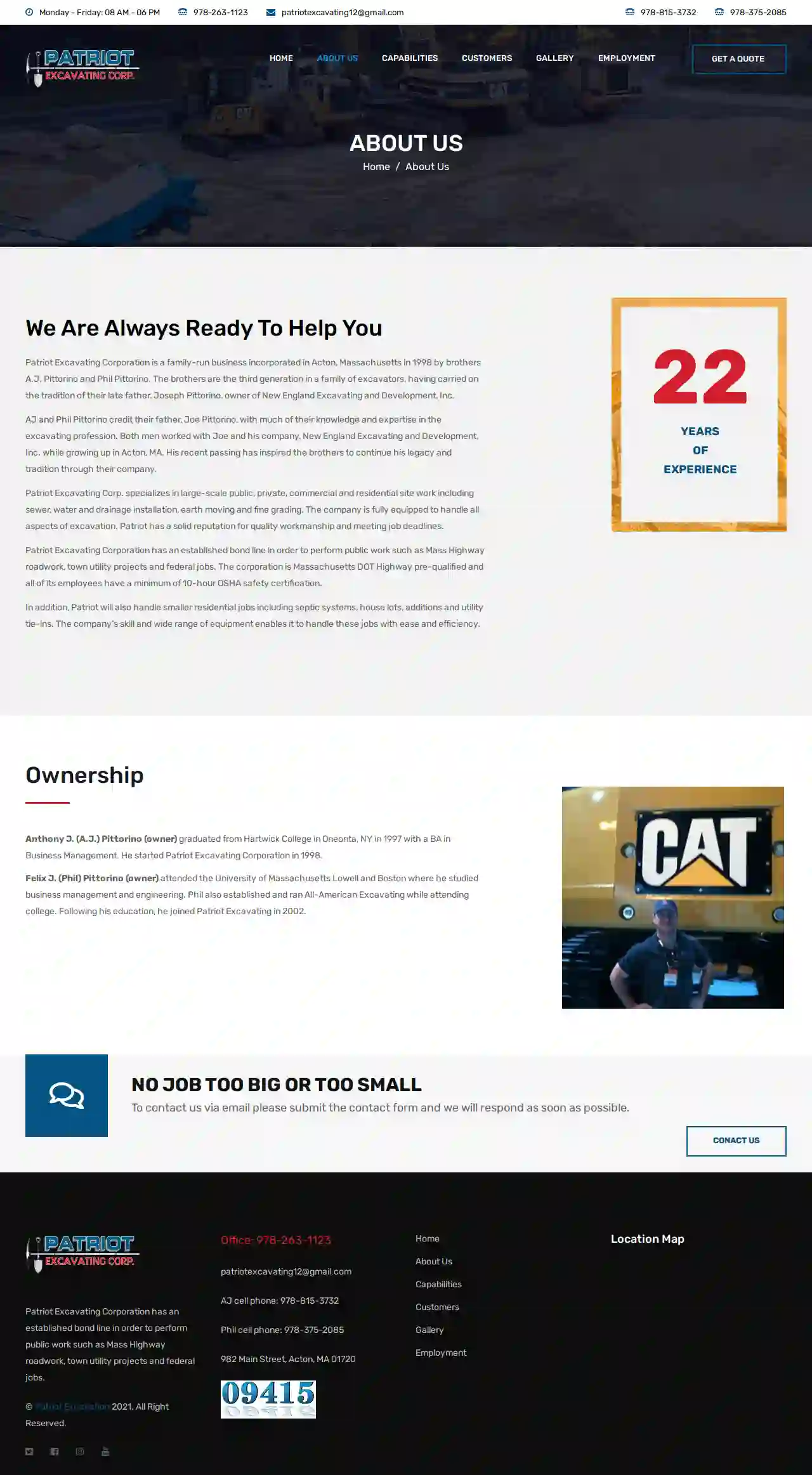
Patriot Excavation
982 Main Street, Acton, 01720, USAbout Us Patriot Excavating Corporation is a family-run business incorporated in Acton, Massachusetts in 1998 by brothers A.J. Pittorino and Phil Pittorino. They are the third generation in a family of excavators, carrying on the tradition of their late father, Joseph Pittorino, owner of New England Excavating and Development, Inc. A.J. and Phil Pittorino credit their father, Joe Pittorino, with much of their knowledge and expertise in the excavating profession. Both men worked with Joe and his company, New England Excavating and Development, Inc. while growing up in Acton, MA. His recent passing has inspired the brothers to continue his legacy and tradition through their company. Our Services Patriot Excavating Corp. specializes in large-scale public, private, commercial and residential site work including sewer, water and drainage installation, earth moving and fine grading. The company is fully equipped to handle all aspects of excavation. Patriot has a solid reputation for quality workmanship and meeting job deadlines. Patriot Excavating Corporation has an established bond line in order to perform public work such as Mass Highway roadwork, town utility projects and federal jobs. The corporation is Massachusetts DOT Highway pre-qualified and all of its employees have a minimum of 10-hour OSHA safety certification. In addition, Patriot will also handle smaller residential jobs including septic systems, house lots, additions and utility tie-ins. The company’s skill and wide range of equipment enables it to handle these jobs with ease and efficiency. Our Team Anthony J. (A.J.) Pittorino (owner) graduated from Hartwick College in Oneonta, NY in 1997 with a BA in Business Management. He started Patriot Excavating Corporation in 1998. Felix J. (Phil) Pittorino (owner) attended the University of Massachusetts Lowell and Boston where he studied business management and engineering. Phil also established and ran All-American Excavating while attending college. Following his education, he joined Patriot Excavating in 2002.
- Services
- Why Us?
- Our Team
- Gallery
Get Quote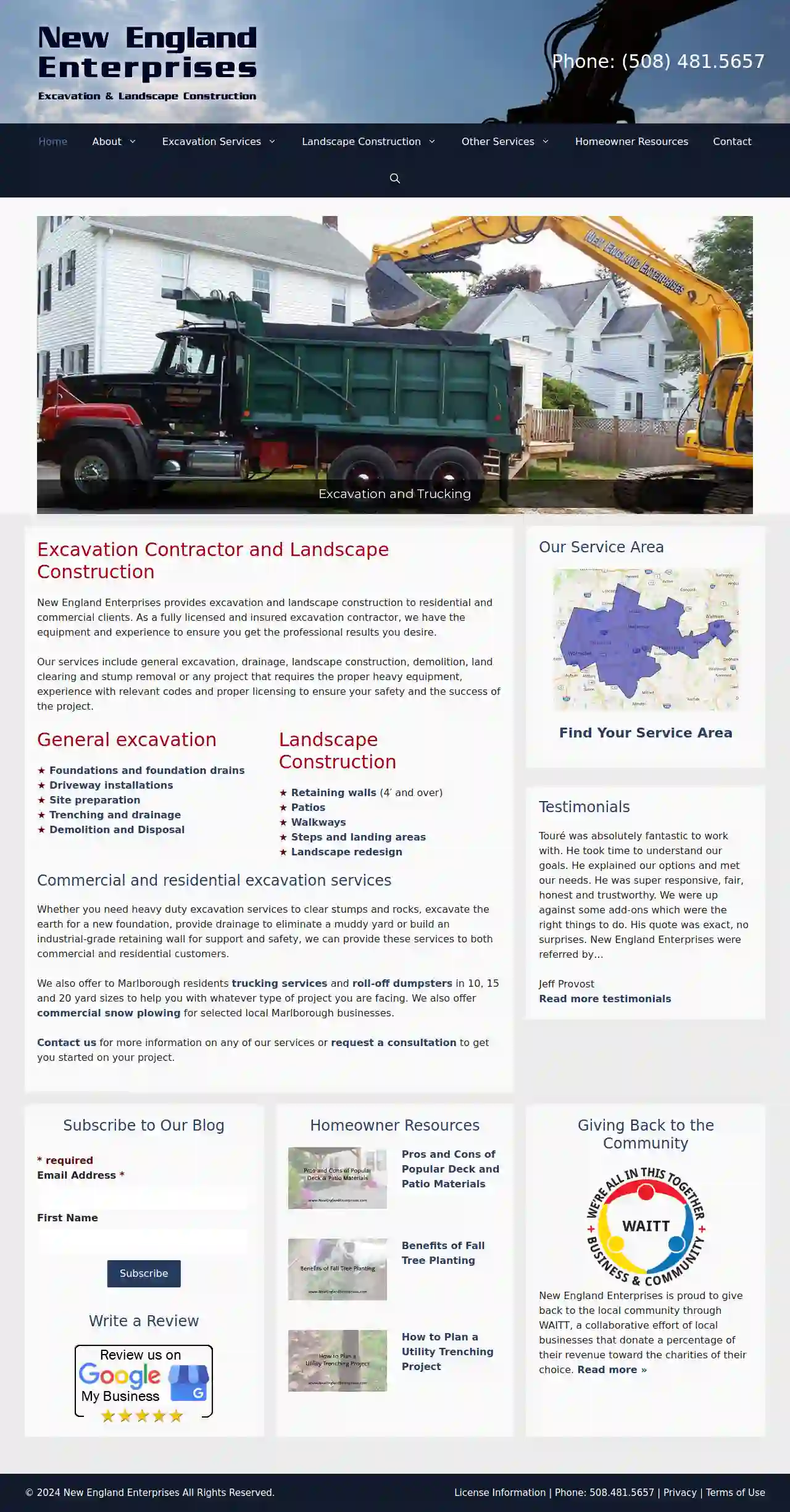
New England Enterprises
510 reviewsPlymouth, USExcavation Contractor and Landscape Construction New England Enterprises provides excavation and landscape construction to residential and commercial clients. As a fully licensed and insured excavation contractor, we have the equipment and experience to ensure you get the professional results you desire. Our services include general excavation, drainage, landscape construction, demolition, land clearing and stump removal or any project that requires the proper heavy equipment, experience with relevant codes and proper licensing to ensure your safety and the success of the project. Whether you need heavy duty excavation services to clear stumps and rocks, excavate the earth for a new foundation, provide drainage to eliminate a muddy yard or build an industrial-grade retaining wall for support and safety, we can provide these services to both commercial and residential customers. We also offer to Marlborough residents trucking services and roll-off dumpsters in 10, 15 and 20 yard sizes to help you with whatever type of project you are facing. We also offer commercial snow plowing for selected local Marlborough businesses. Contact us for more information on any of our services or request a consultation to get you started on your project.
- Services
- Why Us?
- Testimonials
- Gallery
Get Quote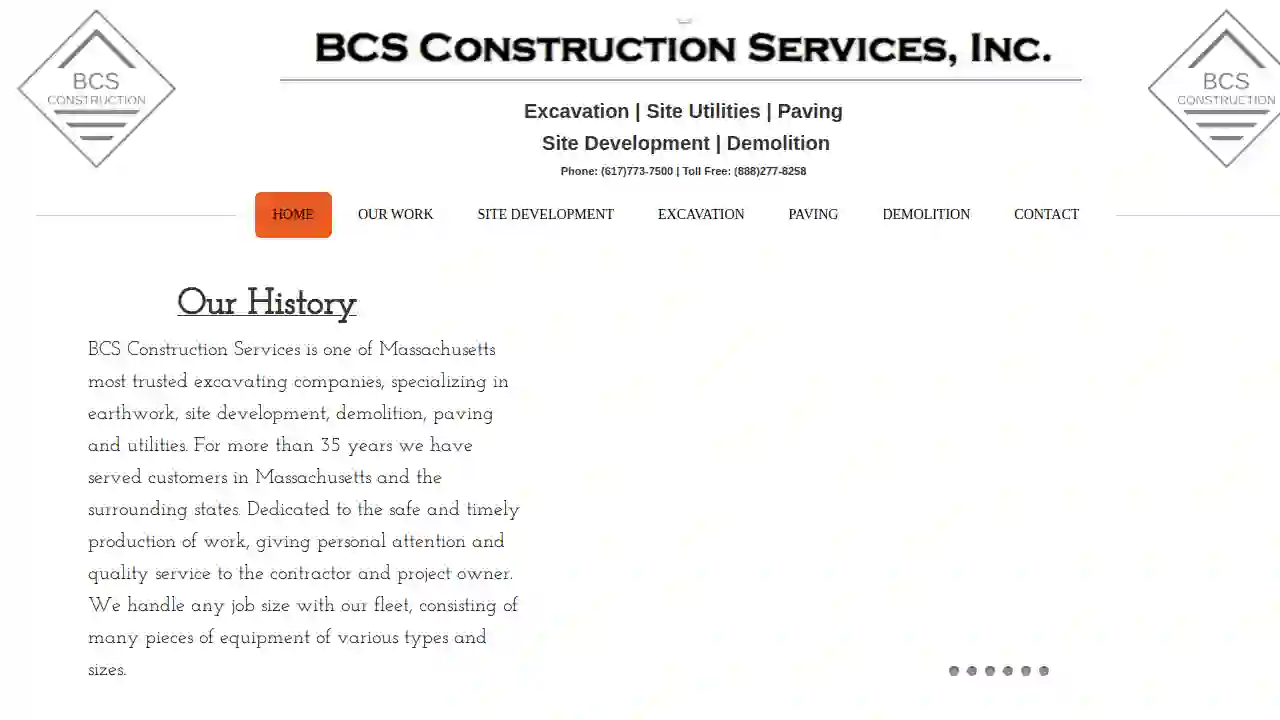
Boston Contracting Services
859 Willard Street, Suite 400, Quincy, 02169, USBCS Construction Services is a trusted excavating company in Massachusetts, specializing in earthwork, site development, demolition, paving, and utilities. For over 35 years, we've served customers in Massachusetts and surrounding states. We're dedicated to safe and timely work, providing personal attention and quality service to contractors and project owners. We handle any job size with our fleet of diverse equipment. Our Core Focus We specialize in a wide range of services, including: Roads Parking Lots Grading and Compacting Industrial Manhole & Catch Basins Municipal Paving Car Dealerships Demolition Our Services We offer a comprehensive range of services, including: Site Development Excavation Paving Demolition Utilities Licenses & Certifications BCS Construction Services holds various construction and engineering licenses in cities and towns throughout Massachusetts. We are licensed to perform all municipal and commercial work, and we hold licenses to operate interstate when necessary. Our team also holds various safety licenses from OSHA. Insurance & Bonding BCS Construction Services is capable of meeting most insurance requirements for mid to large-size commercial jobs. We also hold various bonds with cities and towns throughout Massachusetts. Other Services BCS Construction Services has provided expert witness testimony to assist in various construction and real estate-related activities. Please contact us directly if you are interested in this service.
- Services
- Why Us?
- Gallery
Get Quote
Consigli Construction Co Inc
4.720 reviews100 Cummings Center, Suite 2200, Beverly, USOur Story A history rooted in tradition, a future led with vision. Learn More > Who We Are A fourth generation company founded in 1905, Consigli offers the strength and stability of a large construction manager and the flexibility of a start-up. Our people love what they do and it shows—in their entrepreneurial spirit, in their desire to create environments that strengthen our communities, in the enduring relationships they build and in the pride they take in their craft. A Legacy Built on Accountability Consigli was founded upon the principles of dedication, hard work and commitment to craft. As we evolve, these things will never change. See the Story > Our People, Our Difference We don’t just assign people to projects—we challenge them to learn, lead, teach, problem-solve and rise to every occasion. Meet the People Who Make It Work > Projects That Move Us It’s our purpose to be builders—it’s ingrained in who we are. We create environments and relationships that strengthen our communities and enrich the ways people live, work, learn, heal and play. Let’s Get to Work >
- Services
- Why Us?
- Gallery
Get Quote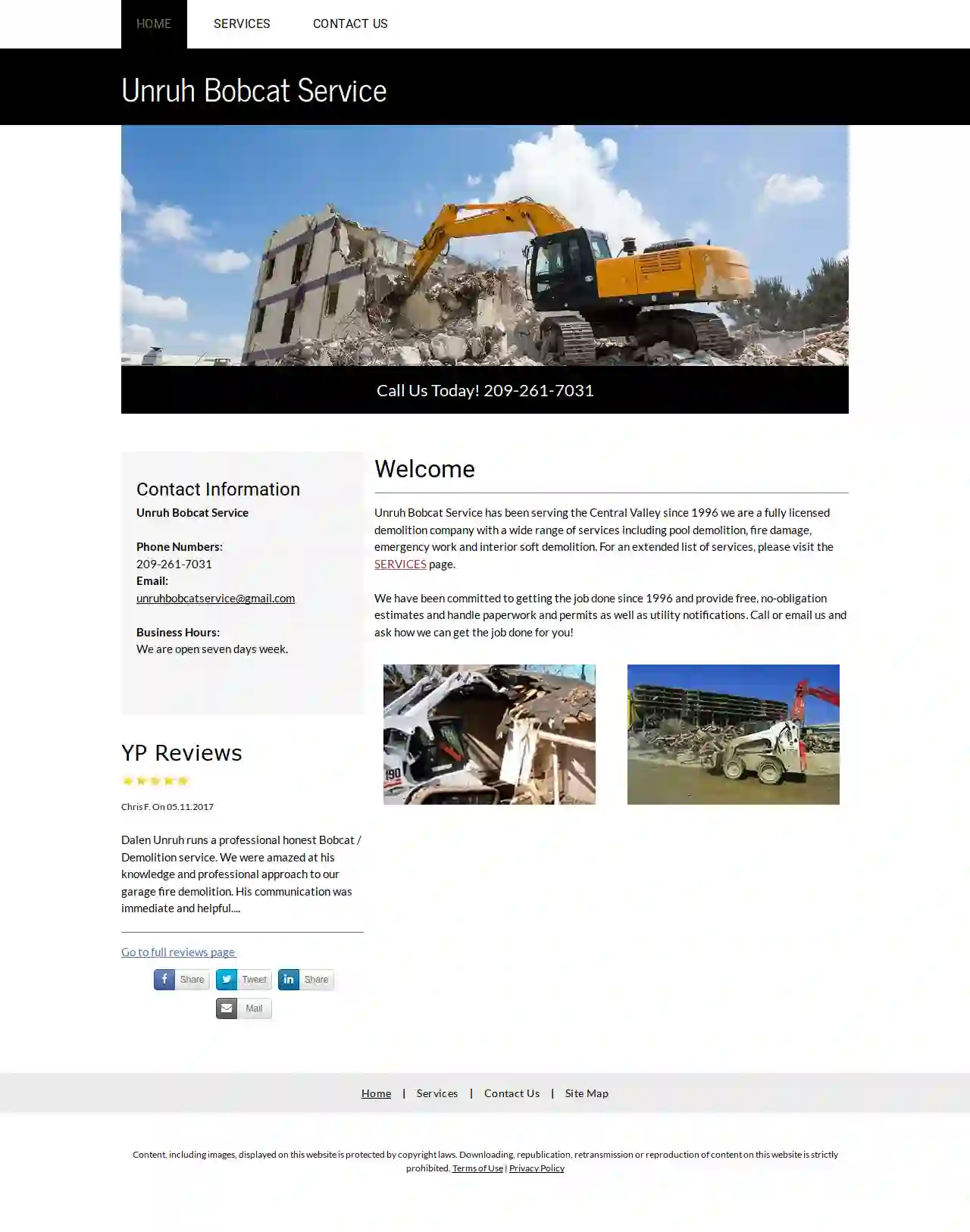
Unruh Bobcat Service
54 reviewsLawrence, USUnruh Bobcat Service: Your Trusted Demolition Partner in the Central Valley Since 1996, Unruh Bobcat Service has been a leading demolition company in the Central Valley, providing comprehensive and reliable services to both residential and commercial clients. We are fully licensed and insured, ensuring peace of mind and professional execution for every project. Our team of experienced professionals is dedicated to delivering exceptional service and exceeding your expectations. We understand that demolition projects can be complex and disruptive, which is why we prioritize clear communication, meticulous planning, and efficient execution. We handle all aspects of the demolition process, from obtaining permits to managing waste disposal, allowing you to focus on other aspects of your project. Whether you need to demolish a building, remove a pool, clear a site, or handle fire damage, Unruh Bobcat Service is your trusted partner. We offer a wide range of services, including: Building Demolition Pool Demolition Debris Removal Concrete Breaking and Removal Site Clearing Scrap Metal Removal Pad Building Excavating Grading We are committed to providing free, no-obligation estimates and handling all necessary paperwork and permits. Our goal is to make the demolition process as smooth and stress-free as possible for you. Contact us today to discuss your project and learn how Unruh Bobcat Service can help you achieve your goals.
- Services
- Why Us?
- Testimonials
- Gallery
Get Quote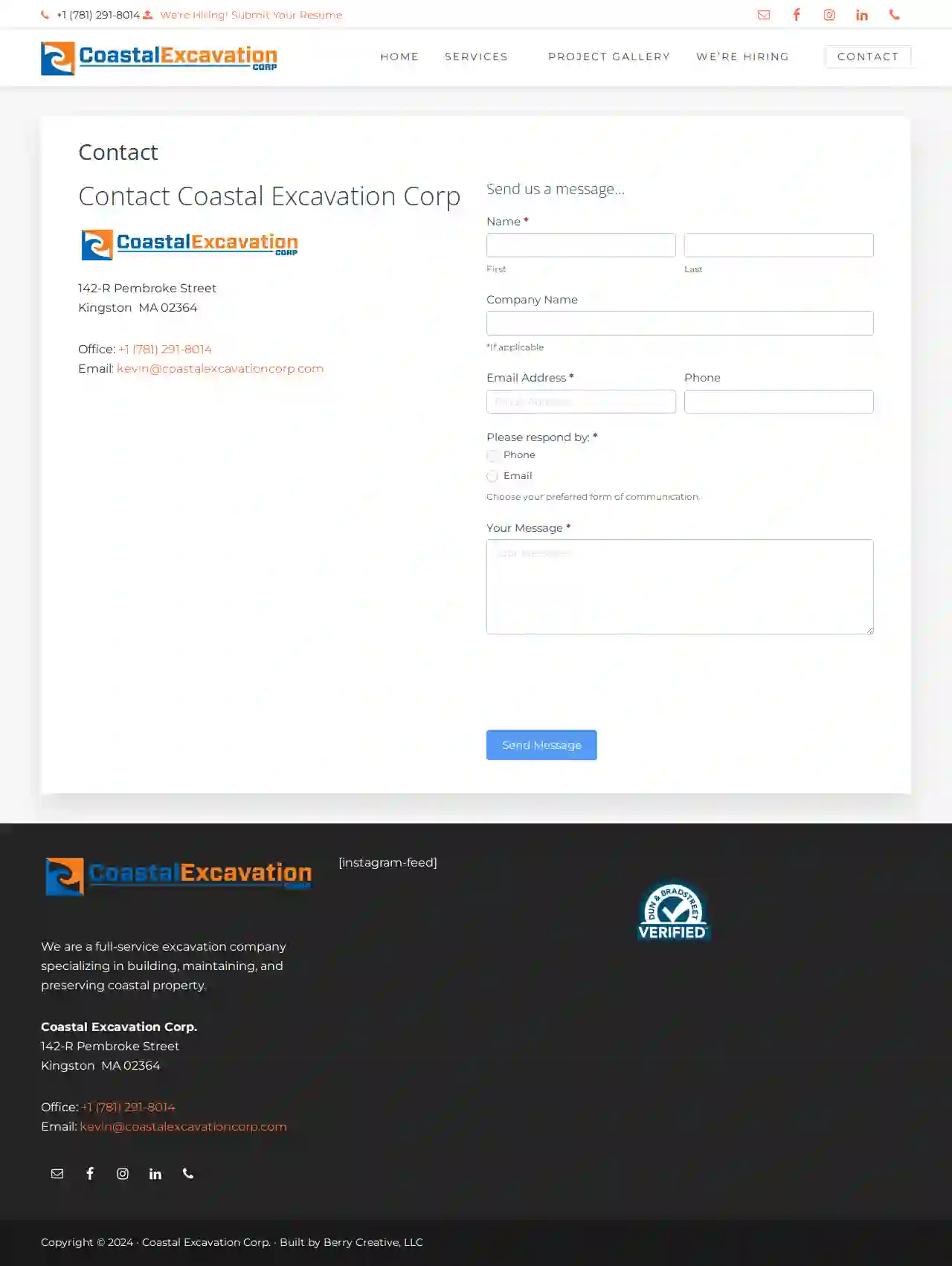
Coastal Excavation Corp
142-R Pembroke Street, Kingston, 02364, USWelcome to Coastal Excavation Corp. Site Development • Landscape Construction • Property Management A full-service excavation company with over 20 years experience working to develop, repair and preserve our precious New England coastline. We face the challenges Mother Nature brings to coastal living What We Do We offer a broad range of coastal management solutions. Based in Duxbury, Massachusetts we serve towns up and down the New England Coastline going wherever our services are needed. Shoreline Construction Landscape Construction Laser Grading Site Development Commercial Property Management Coastal Conservation & Repair There’s Always Something Awesome Going On at Coastal Excavation Corp Our team has a deep respect for Mother Nature and a passion for addressing the challenges she sends our way. Kevin Knippenberg President & Owner Contact Us Today for a Free Consultation We offer a wide range of services. Wondering if we're right for your project? Get in touch and tell us about it. Give Us a Call
- Services
- Why Us?
- Our Team
- Gallery
Get Quote
Unruh Bobcat Services
51 reviewsLawrence, USUnruh Bobcat Service: Your Trusted Demolition Partner in the Central Valley Since 1996, Unruh Bobcat Service has been a leading demolition company in the Central Valley, providing comprehensive and reliable services to both residential and commercial clients. We are fully licensed and insured, ensuring peace of mind and professional execution for every project. Our team of experienced professionals is dedicated to delivering exceptional service and exceeding your expectations. We understand that demolition projects can be complex and disruptive, which is why we prioritize clear communication, meticulous planning, and efficient execution. We handle all aspects of the demolition process, from obtaining permits to managing waste disposal, allowing you to focus on other aspects of your project. Whether you need to demolish a building, remove a pool, clear a site, or handle fire damage, Unruh Bobcat Service is your trusted partner. We offer a wide range of services, including: Building Demolition Pool Demolition Debris Removal Concrete Breaking and Removal Site Clearing Scrap Metal Removal Pad Building Excavating Grading We are committed to providing free, no-obligation estimates and handling all necessary paperwork and permits. Our goal is to make the demolition process as smooth and stress-free as possible for you. Contact us today to discuss your project and learn how Unruh Bobcat Service can help you achieve your goals.
- Services
- Why Us?
- Testimonials
- Gallery
Get Quote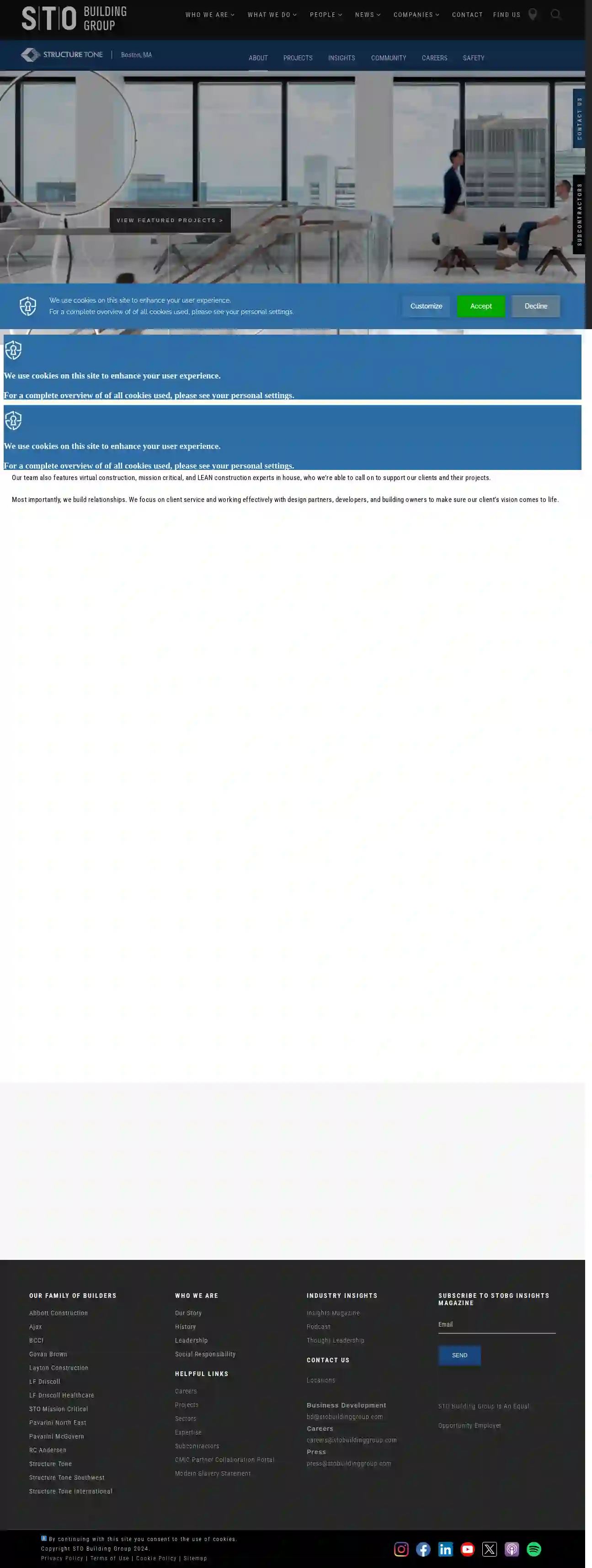
Structure Tone
52 reviewsStamford, USWho We Are We are a family of companies building amazing spaces across the US, Canada, UK and Ireland. History Founded in 1971, we have grown into an organization made up of over 4,700 employees across 54 offices.
- Services
- Why Us?
- Gallery
Get Quote
Orlando Excavation Corp.
54 reviews155 Main Street, Southborough, 01722, USWelcome to Orlando Construction Corp. We take a personal, customized approach with our customers. We are a renown local excavating contractor based in Southborough, MA with over 20 years of experience. Whether it’s a complete site grading, a new septic install, demolition of a large commercial or residential structure, installation of drainage or catch basins, a large retaining wall, a new asphalt parking lot or driveway or a large hardscape project, we take great care and pride in the work we do for you. We are equipped to meet all your project management needs and are committed to delivering the best in quality, service, safety and reliability our clients expect and deserve. The Right Choice… Renown Industry Leader Honest and Trustworthy Service Over 20 Years Experience Free Consultations Fully Licensed, Insured & Bonded We value our customers and are dedicated to serving you See What Our Clients Are Saying… “I am very pleased with the sitework Orlando Construction helped us with on our house lot! Thanks again to Orlando Construction for the great work and for answering all of our questions and concerns along the way. I will definitely be using Orlando Construction again and will recommend them without hesitation!” – Boxborough, MA
- Services
- Why Us?
- Our Team
- Testimonials
- Gallery
Get Quote
Luciano's Excavation Inc
56 reviews41 Taunton Green Suite 102, Taunton, 02780, USABOUT US Lucianos Excavation is a family owned and operated business. We provide experience and guidance throughout the construction process. With Cost Effective Solutions, we apply best business practices to complete and meet your needs. Luciano Ribeiro came over to America in 1985, from the Cape Verde islands. After ten years of building boats for Boston Whaler, he decided he needed a new career and turned to construction in 1995. He started from the ground up, as a laborer, doing what ever he could to soak up all the knowledge around him. After a year of hard work and staying late off the clock to learn how to move the equipment, they finally gave him a chance to operate machinery. Starting off in the loader gave him a chance to get the feel for heavy equipment, after 3 years of gaining experience he was finally able to get into the excavator. 25 years later he has now become one of the best excavator operators in New England, and his quality of work never goes unnoticed! From dredging ponds to putting in revetments, there is nothing he is unable to do in an excavator!
- Services
- Why Us?
- Gallery
Get Quote
Over 22,076+ Excavation Pros registered
Our excavation pros operate in Salem and beyond!
ExcavationHQ has curated and vetted Top Excavation Businesses in Salem. Find a reliable contractor today.
Frequently Asked Questions About Demolition Contractors
- Feasibility Studies: Assessing the viability and challenges of a demolition project.
- Demolition Planning: Developing demolition plans, including method selection, sequencing, and safety procedures.
- Permitting Assistance: Navigating the demolition permitting process and ensuring compliance with regulations.
- Hazardous Material Surveys: Identifying and managing hazardous materials, such as asbestos and lead paint.
- Cost Estimating: Providing accurate cost estimates for demolition services.
- Project Management: Overseeing the demolition process and ensuring it proceeds as planned.
- Enclosure: Sealing off the asbestos-containing material to prevent fiber release.
- Encapsulation: Coating the asbestos-containing material with a sealant to bind the fibers.
- Removal: Carefully removing the asbestos-containing material and disposing of it safely.
- Size and Type of Structure: The method should be suitable for the structure's size, height, and construction materials.
- Site Location and Accessibility: The method should be feasible given the site's location, surrounding buildings, and access constraints.
- Environmental Considerations: Prioritize methods that minimize environmental impact, such as deconstruction or selective demolition if feasible.
- Budget: Different demolition methods have varying costs, so choose one that fits your budget.
- Safety: Prioritize methods that ensure worker safety and minimize risks to surrounding areas.
What is the role of a demolition consultant?
How can I tell if my building contains asbestos?
What are the different methods of asbestos abatement?
How do I choose the right demolition method for my project?
What is the role of a demolition consultant?
- Feasibility Studies: Assessing the viability and challenges of a demolition project.
- Demolition Planning: Developing demolition plans, including method selection, sequencing, and safety procedures.
- Permitting Assistance: Navigating the demolition permitting process and ensuring compliance with regulations.
- Hazardous Material Surveys: Identifying and managing hazardous materials, such as asbestos and lead paint.
- Cost Estimating: Providing accurate cost estimates for demolition services.
- Project Management: Overseeing the demolition process and ensuring it proceeds as planned.
How can I tell if my building contains asbestos?
What are the different methods of asbestos abatement?
- Enclosure: Sealing off the asbestos-containing material to prevent fiber release.
- Encapsulation: Coating the asbestos-containing material with a sealant to bind the fibers.
- Removal: Carefully removing the asbestos-containing material and disposing of it safely.
How do I choose the right demolition method for my project?
- Size and Type of Structure: The method should be suitable for the structure's size, height, and construction materials.
- Site Location and Accessibility: The method should be feasible given the site's location, surrounding buildings, and access constraints.
- Environmental Considerations: Prioritize methods that minimize environmental impact, such as deconstruction or selective demolition if feasible.
- Budget: Different demolition methods have varying costs, so choose one that fits your budget.
- Safety: Prioritize methods that ensure worker safety and minimize risks to surrounding areas.